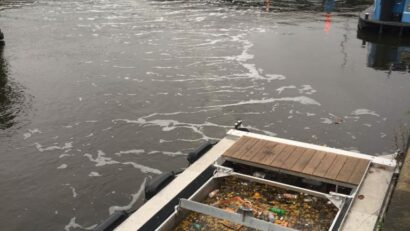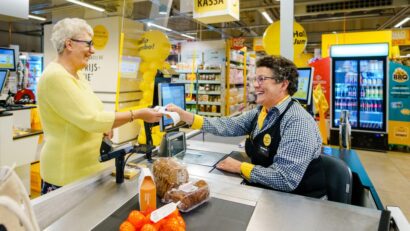
Dutch startup uses air bubbles to remove plastic from rivers
Dutch startup “The Great Bubble Barrier” has been building “air curtains” and removing tons of plastic from rivers since 2017. The technology is simple and promising. With the help of pipes in the water, a curtain of air is formed. Fish and other river dwellers can swim through it, while plastic waste is intercepted.
The Amsterdam-based startup has been working on the technology behind the so-called “bubble barrier” for seven years. Initial pilot tests started in spring 2017, and the first filter system has been in place on the River IJssel in the Netherlands since November of the same year. Even tiny pieces of plastic with a diameter of one millimetre can be fished out of the water with it. The startup is currently testing whether even smaller plastic particles, i.e. less than 0.05 millimetres, can be filtered with the air barrier.
[embedded content]
Simple technology, clean rivers, healthy people
The way the air barrier works is simple. Pipes at the bottom of a river or canal pump air into the water. Combined with the current, the plastic pollution is collected together on one bank. From there, the plastic goes into a collection system. Then the trash is separated and can be disposed of properly. The start-up’s invention would also be great outside the Netherlands, because Austria’s rivers are also full of trash.
The WWF reports that almost two-thirds of Austria’s waters need to be “cleaned up.” Only 15 percent are still in “very good” condition, the paper states. Reasons for the pollution include the heavy construction density of some regions, as well as the industrial usage – such as sewage disposal or cargo shipping – of rivers. Environment Minister Gewessler (Green Party) complained about the “littering of our environment and waters”, but the interim report of the “Action Plan Microplastics” is still pending.
A stream of air bubbles propels the trash into a collection bin (Photo: The Great Bubble Barrier®)
Nearly 80 percent of plastic pollution in the sea comes from rivers
The technology from Holland not only holds promise for cleaning up freshwater streams, but also contributes to the cleaning of the oceans. Around 80 percent of plastic in the world’s seas comes from rivers. Currently, it is estimated that there are between 100 and 150 million tons of trash in the oceans. More than three-quarters of this is plastic. Every year, rivers wash between five and thirteen million tons more into the seas. Four million tons come from just ten major streams.
“We tested for six months in Amsterdam, and during this period we removed around 85 kilograms of plastic per month from the water,” say the founders of “The Great Bubble Barrier.
Projected over a year, that’s more than a ton of plastic waste. This is good not only for the environment, but also for people. Because the trash doesn’t just stay in the water. Fish and other sea creatures eat the plastic pollution. These then get back into the human organism via food, and there the – so called – microplastics can even lead to hormonal changes. Clean oceans, intact environment, healthier people – that seems to be the promise of the air curtain technology from the Netherlands. Läs mer…
